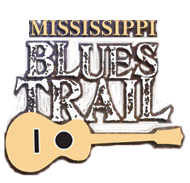Sunflower River Blues
Sunflower River Blues - Clarksdale
This marker is temporarily down for repair.
The Sunflower River Blues & Gospel Festival, a preeminent showcase for homegrown Mississippi talent, began in 1988 as a promotion to draw area shoppers to downtown Clarksdale. The festival’s dedication to presenting authentic blues soon made it a renowned attraction for blues enthusiasts from around the world, as local favorites began sharing the stage with an international cast of guest stars.
The Sunflower River Blues Festival evolved from the free Holiday Music Festivals sponsored in 1986 and 1987 by the Downtown Association of Clarksdale as a local business promotion. In 1988 the merchants, with the Chamber of Commerce and other organizations, opted for a full-fledged festival, initially called the Sunflower Riverbank Blues Festival, featuring Otis Rush, James “Son” Thomas, Jessie Mae Hemphill, and others on three different stages. A biracial group of volunteers with a mission “to preserve, promote, perpetuate and document the blues in its homeland” formed the nonprofit Sunflower River Blues Association (SRBA) in 1990 and produced the annual festival at various locations around town until the newly constructed Delta Blues Museum (DBM) stage became its primary base. The North Delta Academy of Gospel Music presented its first festival in 1992 and joined with the SRBA in 1993 to form the Sunflower River Blues & Gospel Festival. As a showcase for Mississippi Delta talent in a town seeped in blues history and Southern hospitality, the festival earned widespread acclaim from the worldwide blues community as well as from travel organizations and news media.
During its first twenty-five years the festival presented many acts from around the country and overseas, including musicians from Clarksdale’s sister city, Notodden, Norway, but always maintained its primary focus on blues, soul, and gospel performers with roots in Mississippi. Local bassist Wesley Jefferson’s band played at every festival prior to his death in 2009, and others who appeared numerous times included the Rising Star Fife & Drum Band (led by Othar Turner and later by his granddaughter Sharde Thomas), Big Jack Johnson, Sam Carr, James “Super Chikan” Johnson, Wade Walton, Eddie Cusic, T-Model Ford, C. V. Veal, Pat Thomas, Foster “Mr. Tater” Wiley, Johnnie Billington, Arthneice Jones, Lonnie Shields, John Mohead, Lonnie Pitchford, Robert “Bilbo” Walker, Jimbo Mathus, and Terry “Big T” Williams. Among the repeat headliners were Bobby Rush, Charlie Musselwhite, Denise LaSalle, Otis Clay, Latimore, and Nathaniel Kimble.
The festival played a key role in Clarksdale’s development into a mecca for blues tourists and media, building on cornerstones laid earlier by local juke joints, Wade Walton’s barbershop, and the Delta Blues Museum. More businesses began courting the blues trade, as did new events such as the annual Juke Joint Festival. Clarksdale provided city support for the festival and passed or amended laws to accommodate festival and nightclub activity, and Coahoma County established a tourism commission in 1991. To recognize the efforts of those who have worked on behalf of blues and gospel, the festival began presenting an annual Early Wright Award in 1991 in honor of the legendary Clarksdale deejay, followed by the Julius Guy Award, named for the co-founder of the gospel festival.
[ BACK TO TOP ]

